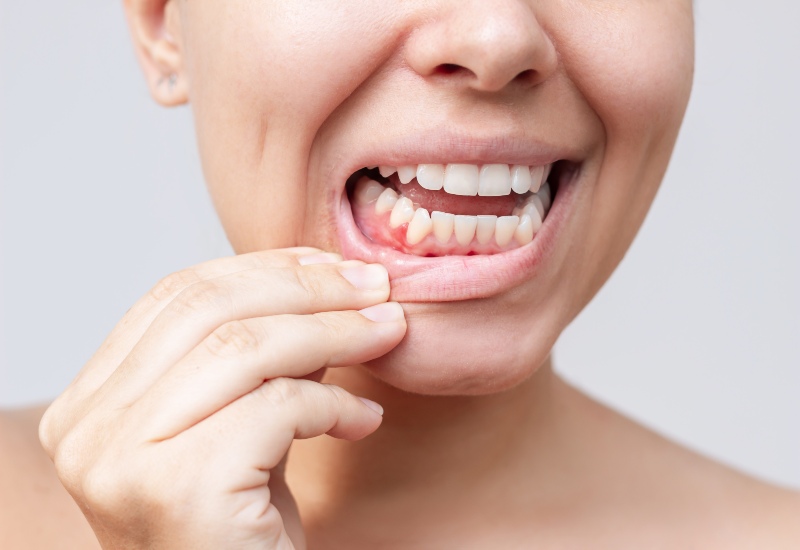What Are the Early Signs of Gum Disease?
Early Signs of Sore Gums
Gum disease—clinically referred to as periodontal disease—is a widespread condition that often goes unnoticed before it causes significant damage. While it may start subtly, gum disease may progress quickly if left untreated, and can lead to serious dental problems—including tooth loss. Recognizing the early gum disease symptoms is key to protecting your smile and overall health. At Trenton Dental Care, we believe that education is the first step toward preventing sore gums in Trenton, MI. In this blog, we’ll explore the signs of gum disease, what causes it, how to treat it, and when to seek professional help.

What Is Gum Disease?
Gum disease is an infection of the tissues surrounding and supporting your teeth. The earliest stage of gum disease is gingivitis, which causes mild inflammation and is often reversible with proper care. If not addressed, gingivitis can progress to periodontitis, a more severe condition that damages the bone and connective tissue holding your teeth in place. The good news? Gum disease is generally preventable—and treatable—when caught early.
Common Early Gum Disease Symptoms
The earliest gum disease warning signs are often subtle but shouldn’t be ignored. Explore some of the most common symptoms to watch for:
- Bleeding Gums
One of the first indicators of gum disease is bleeding during brushing or flossing. While occasional bleeding might seem harmless, it’s often a sign of inflammation caused by plaque buildup. Understanding the causes of bleeding gums—such as poor oral hygiene or hormonal changes—can help you take action early.
- Swollen or Tender Gums
Healthy gums should be firm and pink. It could be a sign of gingivitis if your gums appear red, puffy, or feel sore and tender. Swollen gums treatment typically involves improved oral hygiene and professional cleanings to remove plaque and tartar.
- Persistent Bad Breath
Also known as halitosis, persistent bad breath may be caused by bacteria trapped under the gumline. If brushing and mouthwash don’t help, it may be time to consider gum disease as the underlying issue.
- Gum Recession
If your teeth appear longer than usual, it could be due to gum recession, where the gum tissue pulls away from the teeth. This exposes the roots and can increase sensitivity, which may make it easier for bacteria to invade.
- Tooth Sensitivity or Mobility
As gum disease progresses, it can affect the stability of your teeth. You may notice increased sensitivity to hot or cold foods, or even feel that your teeth are shifting or becoming loose.
Periodontal Disease Indicators
Beyond the early symptoms, more advanced periodontal disease indicators signal the need for immediate dental care. These signs suggest that the infection has spread deeper into the gum tissue and bone, which may require more intensive treatment such as scaling and root planing or surgical intervention. Here are some signs of indicators:
- Formation of deep pockets between teeth and gums
- Pus between the teeth and gums
- Changes in bite or alignment
- Pain while chewing

What Causes Gum Disease?
Gum disease is primarily caused by plaque, a sticky film of bacteria that forms on teeth. If not removed through regular brushing and flossing, plaque hardens into tartar, which can only be removed by a dental professional. Other contributing factors may include:
- Smoking or tobacco use
- Poor nutrition
- Diabetes
- Hormonal changes (e.g., pregnancy or menopause)
- Certain medications
- Genetic predisposition
Swollen Gums Treatment Options
If you’re experiencing swollen gums, the first step is to improve your oral hygiene routine. Brush twice daily with a soft-bristled toothbrush, floss regularly, and use an antimicrobial mouthwash. Professional treatment options at Trenton Dental Care include:
- Dental cleanings to remove plaque and tartar
- Scaling and root planing to clean below the gumline
- Antibiotic therapy to reduce infection
- Laser therapy for minimally invasive treatment
Our team will assess your condition and recommend the best course of action to restore your gum health.
When to See a Dentist
If you notice any of the early gum disease symptoms mentioned above, don’t wait. Gum disease doesn’t go away on its own—it requires professional care. You should schedule a visit to Trenton Dental Care if you experience:
- Bleeding gums during brushing or flossing
- Red, swollen, or tender gums
- Persistent bad breath
- Receding gums or tooth sensitivity
- Loose teeth or changes in bite
Protect Your Smile Today
Gum disease may start quietly, but its long-term effects can be loud and life-altering. From bleeding gums and persistent bad breath to gum recession and tooth loss, the consequences of ignoring the signs of gum disease are severe. The good news is that gum disease is preventable and treatable with early detection and proper care. At Trenton Dental Care, we understand how crucial oral health is to your overall well-being. We emphasize patient education, preventive care, and personalized treatment plans. Whether you’re experiencing sore gums, noticing tender gums, or want peace of mind about your gum health, our experienced team is here to help. We serve patients in Trenton, MI, and surrounding communities with compassionate care and advanced dental technology. We aim to catch problems early—before they become painful or costly. If you’ve noticed any early gum disease symptoms, don’t wait for them to worsen. Taking action now can save your smile and protect your health for years to come.
Remember, healthy gums are the foundation of a healthy mouth. Regular dental checkups, good oral hygiene habits, and prompt attention to symptoms are your best defense against periodontal disease. Let us be your partner in maintaining a confident, pain-free smile.
